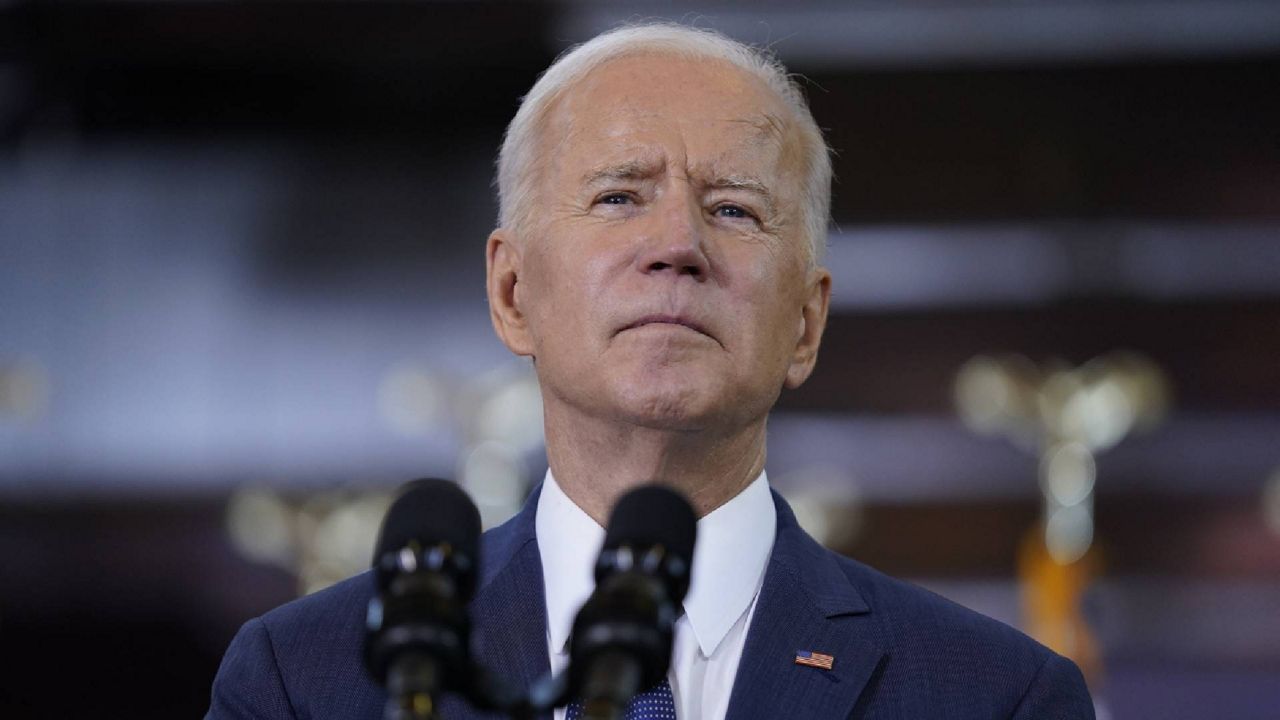President Joe Biden issued a statement on Saturday attempting to clarify his position on his ‘two-track’ infrastructure bill — the $1.2 trillion bipartisan agreement and a larger companion budget reconciliation measure — saying that he did not mean to suggest a "veto threat" to the bipartisan measure if the spending bill was not passed alongside it.
On Thursday, President Biden said that the measures needed to move in “tandem,” adding: “If they don’t come, I’m not signing. Real simple.”
The two measures were always expected to move together through Congress.
Though Biden had been clear he would pursue roughly $6 trillion in new spending for child care, Medicare and other investments, Republicans balked at the president’s notion that he would not sign one without the other. “If this is the only thing that comes to me, I’m not signing it,” Biden said then of the infrastructure bill. “It’s in tandem.”
Biden’s comments were likely aimed at the more progressive wing of the Democratic Party, which expressed concerns that the bipartisan agreement did not go far enough.
House Speaker Nancy Pelosi earlier that same day pledged that "there ain't going to be an infrastructure bill unless we have the reconciliation bill.”
"We will not take up a bill in the House until the Senate passes the bipartisan bill and a reconciliation bill," Pelosi said. "If there is no bipartisan bill then we'll just go when the Senate passes a reconciliation bill. But I'm hopeful that we will have the bipartisan bill.”
“At a press conference after announcing the bipartisan agreement, I indicated that I would refuse to sign the infrastructure bill if it was sent to me without my Families Plan and other priorities, including clean energy,” Biden wrote. “That statement understandably upset some Republicans, who do not see the two plans as linked; they are hoping to defeat my Families Plan — and do not want their support for the infrastructure plan to be seen as aiding passage of the Families Plan.”
“My comments also created the impression that I was issuing a veto threat on the very plan I had just agreed to, which was certainly not my intent,” Biden continued.
“So to be clear: our bipartisan agreement does not preclude Republicans from attempting to defeat my Families Plan; likewise, they should have no objections to my devoted efforts to pass that Families Plan and other proposals in tandem,” Biden added. “We will let the American people — and the Congress — decide.”
White House aides scrambled in the aftermath of Biden’s remarks to put the bipartisan infrastructure deal back on track after Republican senators expressed opposition to the president’s stance of pairing the agreement with a much larger spending bill.
Some senators felt “blindsided” by what they said was a shift in their understanding of his position.
“I intend to pursue the passage of that plan, which Democrats and Republicans agreed to on Thursday, with vigor,” Biden added. “It would be good for the economy, good for our country, good for our people. I fully stand behind it without reservation or hesitation.”
Biden’s earlier remarks had drawn sharp criticism from some Republicans, including Sen. Lindsey Graham, R-S.C., who tweeted on Friday, “No deal by extortion!” Others felt “blindsided” by what they said was a shift in their understanding of his position.
Tensions appeared to calm afterward, when senators from the group of negotiators convened a conference call, according to a person who spoke on condition of anonymity to discuss the private meeting.
According to a person familiar with the aides’ calls to lawmakers, Biden’s team portrayed the fallout from his remarks as nothing more than the back-and-forth that can happen in Washington negotiations. Biden plans to pitch the deal in trips around the country and is confident it will become law, said this person, who was not authorized to publicly discuss the private conversations and spoke on condition of anonymity.
“My hope is that we’ll still get this done,” said Ohio Sen. Rob Portman, the lead Republican negotiator, in an interview Friday with The Associated Press. “It’s really good for America. Our infrastructure is in bad shape. It’s about time to get it done.”
A bipartisan accord has been important for the White House as it tries to show centrist Democrats, including Sinema, Sen. Joe Manchin, D-W.Va., and others that it is working with Republicans before Biden tries to push the broader package through Congress.
“There’s a lot of conversations taking place right now as to what the president meant,” said Sen. Bill Cassidy, R-La., in an interview with a Fox affiliate in New Orleans shared by his office.
Cassidy noted that the president may have misspoken and said he hoped “it won’t be as if we crafted something just to give the president a point of leverage to get something that Republicans disagree with.”
Ten Republican senators would be needed to pass the bipartisan accord in the 50-50 Senate, where 60 votes are required to advance most bills.
While the senators in the bipartisan group are among some of the more independent-minded lawmakers, known for bucking their party’s leadership, it appears criticism by Senate Republican leader Mitch McConnell of Biden’s approach could peel away GOP support.
The Associated Press contributed to this report.



